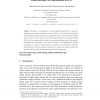662 search results - page 52 / 133 » Formalizing Basic First Order Model Theory |
107
Voted
ICFP
2006
ACM
16 years 2 months ago
2006
ACM
A transient hardware fault occurs when an energetic particle strikes a transistor, causing it to change state. These faults do not cause permanent damage, but may result in incorr...
149
click to vote
FM
2003
Springer
15 years 7 months ago
2003
Springer
We present a novel application on model checking through SPIN as a means for verifying purely descriptive specifications written in TRIO, a first order, linear-time temporal logic ...
134
click to vote
AGP
1994
IEEE
15 years 6 months ago
1994
IEEE
Kowalski and Sergot's Event Calculus (EC) is a formalism for reasoning about time and change in a logic programming framework. From a description of events which occur in the...
133
click to vote
MOBIHOC
2004
ACM
16 years 1 months ago
2004
ACM
Clock synchronization is a crucial basic service in typical sensor networks, since the observations of distributed sensors more often than not need to be ordered ("a happened...
125
click to vote
BMCBI
2006
15 years 2 months ago
2006
Background: A central goal of molecular biology is to understand the regulatory mechanisms of gene transcription and protein synthesis. Because of their solid basis in statistics,...

